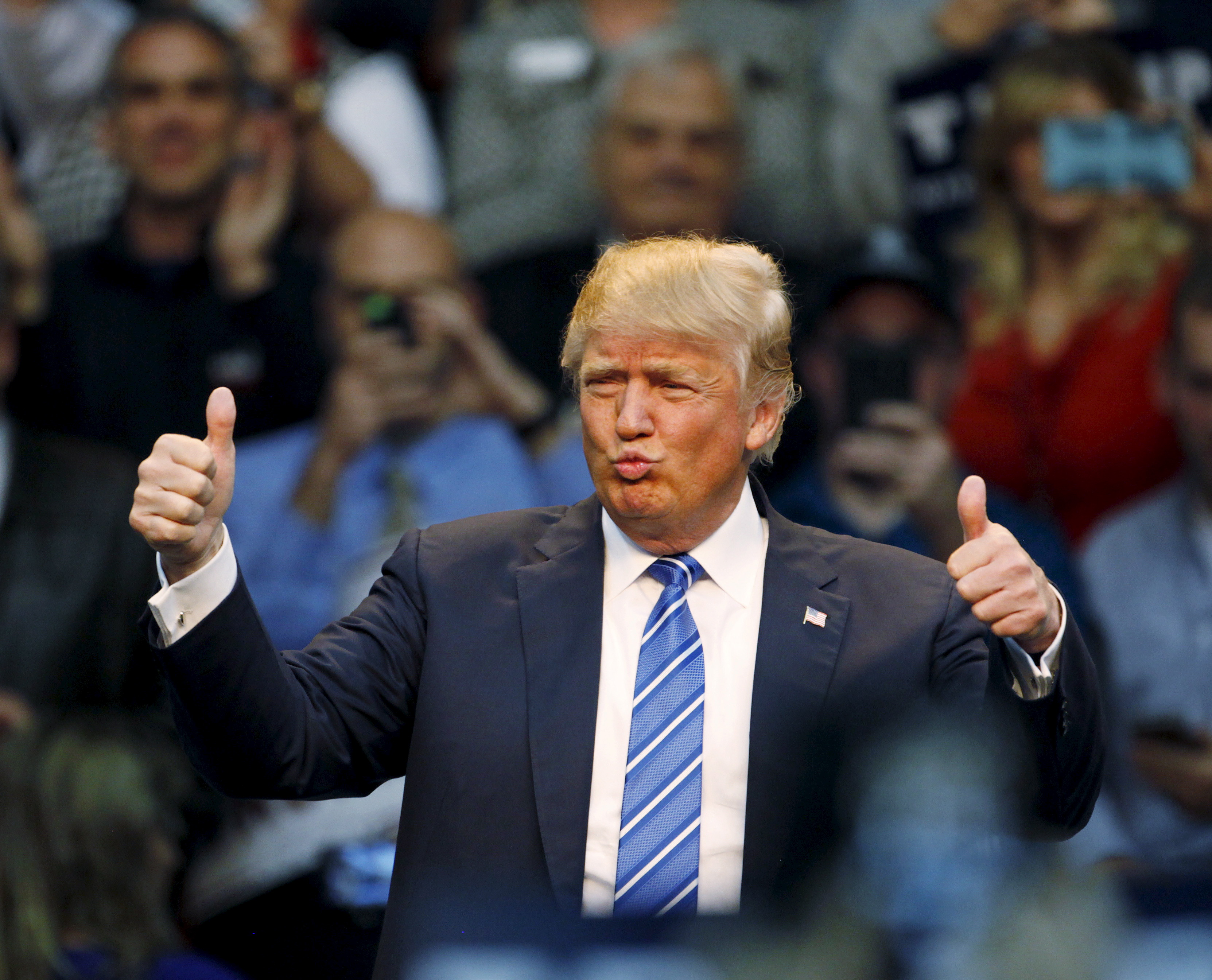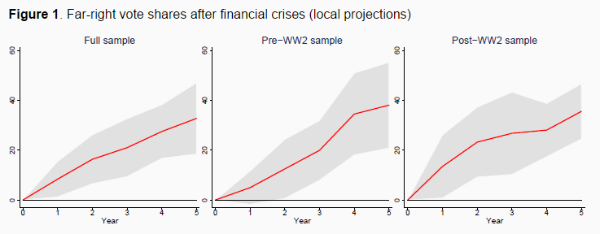The rise of a fascist Donald Trump is partly the fault of D.C. elites
Extreme politics festers in times of economic weakness caused by austerity


A free daily email with the biggest news stories of the day – and the best features from TheWeek.com
You are now subscribed
Your newsletter sign-up was successful
American elites have watched with increasing nervousness as Republican presidential frontrunner Donald Trump has continued to ratchet up his fascist rhetoric, most recently with a call for banning all Muslim travel to the U.S. (even prohibiting the re-entry of Muslim American citizens currently abroad). But we're not the only nation with an alarming rise in hard-right politics — in French regional elections on Monday, Marine Le Pen's National Front cruised to a substantial victory.
As with any political development, there are many idiosyncratic reasons for the rise of Trump and Le Pen, from the increasingly deranged bigotry and paranoia of conservative media for the former to the legacy of the French-Algerian War for the latter. But another explanation common to both America and the entire EU is poor economic policy. Research shows that economic problems, particularly financial crises, tend to increase the support of far-right parties.
Paul Krugman recently pointed to a study of fascist vote share and the Great Depression from a few years ago, conducted by Alan de Bromhead, Barry Eichengreen, and Kevin O'Rourke. They found that economic crises had a pro-fascist electoral effect pretty much everywhere, but it was "greatest where depressed economic conditions are allowed to persist." More recently, Manuel Funke, Moritz Schularick, and Christoph Trebesch studied both pre- and post-WWII electoral results, and found that financial crises led to a large increase in the far-right vote share for up to five years afterwards.
The Week
Escape your echo chamber. Get the facts behind the news, plus analysis from multiple perspectives.

Sign up for The Week's Free Newsletters
From our morning news briefing to a weekly Good News Newsletter, get the best of The Week delivered directly to your inbox.
From our morning news briefing to a weekly Good News Newsletter, get the best of The Week delivered directly to your inbox.

It's not hard to imagine why this might be the case. A recent article by Allison J. Pugh explored how working-class men tend to react during times of pervasive economic insecurity and chronic unemployment:
When I interviewed laid-off men for my recent book on job insecurity, their anger, or more often a wry bitterness, was impossible to forget. By and large, like Gary the laid-off tradesman, they were not angry at their employers. At home, however, they sounded a different note... On his third serious relationship, Gary talked about the "hurt that's been caused to me by a lack of commitment on the part of other people," and he complained that "marriage can be tossed out like a Pepsi can." In the winds of uncertainty, Gary's anger at women keeps him grounded. [Aeon]
Pugh argues this is different from traditional patriarchal values, by which certain relationship rights were seen to be earned by virtue of a man providing for his family. But with quality work out of reach, ideas and politics curdle. Importantly, this is not to say that misogynist reactions are morally justified. They clearly are not — the question is how to react.
The overall problem, which crops up in many different circumstances, is that people tend to look for scapegoats when their lives take a turn for the worse. This isn't often seen in the truly poor, who are so bludgeoned down they mostly suffer in silence, not even bothering to vote. But for those just above the economic floor, or who have recently suffered a blow to perceived social status, the rage can be powerful indeed. And what do you know, polls show that Trump voters are generally the less educated (and hence poorer) part of the GOP electorate.
A free daily email with the biggest news stories of the day – and the best features from TheWeek.com
That brings me back to economic policy. After a laudable but brief turn towards Keynesian stimulus, starting in about 2010 and continuing through 2013 or so, the entire American and EU policy elite was absolutely obsessed with austerity. Right smack in the middle of the worst economic crisis in 80 years, utterly egregious deficit cutting was priority number one for the world's most powerful policymakers. The result: A bad economic performance in the U.S., and something arguably worse than the Great Depression in Europe.
When great swathes of people find the traditional route to a respectable place in society — employment — closed to them, when wages have been stagnant or declining for 40 years, and when the major function of the state seems to be prisons and the cops, one should not be surprised when political alienation and radicalization is the result. Is it any wonder these legions of disaffected and disgruntled people are turning to a fascist promising to protect "us" from "them," and to make "us" great again?
Next time economic disaster strikes, rather than a manic all-consuming focus on making a deficit number go down for no reason, perhaps policymakers ought to give some consideration to jobs and broad economic security. If they don't, they may find the alienated masses they have so long ignored carrying a fascist into the White House.
Ryan Cooper is a national correspondent at TheWeek.com. His work has appeared in the Washington Monthly, The New Republic, and the Washington Post.
-
 Are Hollywood ‘showmances’ losing their shine?
Are Hollywood ‘showmances’ losing their shine?In The Spotlight Teasing real-life romance between movie leads is an old Tinseltown publicity trick but modern audiences may have had enough
-
 A dreamy long weekend on the Amalfi Coast
A dreamy long weekend on the Amalfi CoastThe Week Recommends History, pasta, scenic views – this sun-drenched stretch of Italy’s southern coast has it all
-
 Can foster care overhaul stop ‘exodus’ of carers?
Can foster care overhaul stop ‘exodus’ of carers?Today’s Big Question Government announces plans to modernise ‘broken’ system and recruit more carers, but fostering remains unevenly paid and highly stressful
-
 The billionaires’ wealth tax: a catastrophe for California?
The billionaires’ wealth tax: a catastrophe for California?Talking Point Peter Thiel and Larry Page preparing to change state residency
-
 Bari Weiss’ ‘60 Minutes’ scandal is about more than one report
Bari Weiss’ ‘60 Minutes’ scandal is about more than one reportIN THE SPOTLIGHT By blocking an approved segment on a controversial prison holding US deportees in El Salvador, the editor-in-chief of CBS News has become the main story
-
 Has Zohran Mamdani shown the Democrats how to win again?
Has Zohran Mamdani shown the Democrats how to win again?Today’s Big Question New York City mayoral election touted as victory for left-wing populists but moderate centrist wins elsewhere present more complex path for Democratic Party
-
 Millions turn out for anti-Trump ‘No Kings’ rallies
Millions turn out for anti-Trump ‘No Kings’ ralliesSpeed Read An estimated 7 million people participated, 2 million more than at the first ‘No Kings’ protest in June
-
 Ghislaine Maxwell: angling for a Trump pardon
Ghislaine Maxwell: angling for a Trump pardonTalking Point Convicted sex trafficker's testimony could shed new light on president's links to Jeffrey Epstein
-
 The last words and final moments of 40 presidents
The last words and final moments of 40 presidentsThe Explainer Some are eloquent quotes worthy of the holders of the highest office in the nation, and others... aren't
-
 The JFK files: the truth at last?
The JFK files: the truth at last?In The Spotlight More than 64,000 previously classified documents relating the 1963 assassination of John F. Kennedy have been released by the Trump administration
-
 'Seriously, not literally': how should the world take Donald Trump?
'Seriously, not literally': how should the world take Donald Trump?Today's big question White House rhetoric and reality look likely to become increasingly blurred
